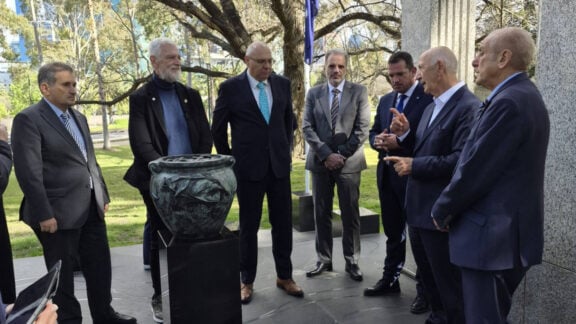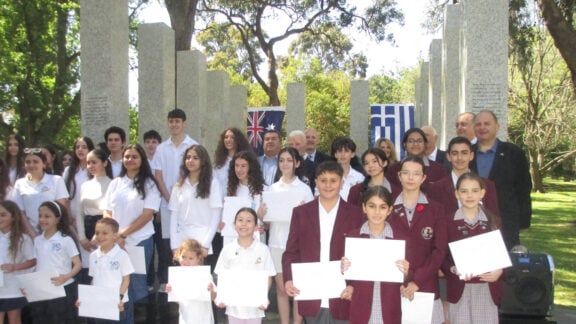The proposal to terminate Modern Greek language studies at La Trobe University, the only such program of its type in Victoria, has caused disbelief in the Greek community of Melbourne. Below is just a small cross-section of letters sent to the leadership of the university by various stakeholders in the community, not including those of politicians and the official stand of the Greek Orthodox Archdiocese of Australia.
Reasons to learn Greek
It is gravely disappointing that Greek, a “Heritage language” is “suddenly under threat of discontinuance from La Trobe University”.
Greek does not simply derive its significance only as a community language or as the norm of the Greek-speaking sector of the Australia community, which is vigorously organised, politically robust and strongly committed to maintenance of its Hellenic-Australian identity.
The significance of Greek for Australia derives principally from heritage, moral, intellectual and utilitarian reasons:
* Moral and intellectual, because Greek is the only extant Heritage language of the Western World known and used in Australia;
* Utilitarian, because of an established presence of a vast number of Greek-speaking residents (currently estimated to 600,000) and of many more thousands of Australians with ancestral, sentimental, professional, cultural and intellectual ties with Greece, Cyprus and the millions of Hellenes in the diaspora.
Whence, the linguistic World Heritage status of Greek is illustrated by a number of aspects outlined below, which inevitably propagate its imperative importance to continue and in fact be promoted extensively at La Trobe University:
1. Greek is the oldest and sole survival of the ancient European languages bearing a linguistic tradition of 4,000 years;
2. Greek remained the language of global civilisation from 480 BC to A.D. 1500 in both oral and written forms and was the official vernacular of the entire Hellenised world from Western Europe to India. Hence, the general use of Greek was of enormous importance to the spread of Christianity;
3. Greek is the sole modern descendant of the Indo-European family of languages, in which fundamental texts of Western Civilisation and Christian scripture were formulated and transmitted through the ages;
4.The entire world of Greek Christians, incorporating the Russians, Rumanians, Ukrainians, Bulgarians, Serbs, Macedoslavs, Syro-Lebanese used Greek as their official language of liturgy and sermons;
5. Greek is designated as one of the five official languages of the European Union and is rated as a major world-language in spite of the comparatively modest number of its current native speakers;
6. Greek composed by reputed individuals of intellect such as Plato, Aristotle, Homer, Aeschylus, Sophocles, Euripides, Herodote, Thucydides, Plutarch, Hippocrates, the Great Fathers of the Christian Church, the great hymnographers, philologists, mathematicians, physicians, anthropologists, ethnologists. Naturally, the notions born herein, expressed through the words of the Greek language, pervaded the languages and the civilisations of the world and left an eternal mark on what is known as the European Civilisation;
7. Approximately, 28,000 English words including key words such as idea, theory, system, analysis, synthesis, category, hierarchy, method, hypothesis, myth, poetry, drama, music, harmony, politics, democracy, thence, machine, episteme, psyche, Eros, ecclesia, Christ, Europe, theology etc are all words of the Greek language, this great little language to paraphrase the Noble Laureate Greek poet, Odysseus Elytis;
8. It would be a cultural deficit for Australia if Greek is to be confined within its current spectrum and not be accessible, in terms of universal education and culture;
9. Every national language constitutes the identity and the physiognomy of that nation;
10. Greek as a Heritage Language, besides of aspects of use and utility, possesses another aspect, the moral one;
11. The significance of Greek for Australia’s external trade resides both in the actual and potential links with the European Union via Greece and Cyprus and via connections between Greece, Cyprus and the Greek-Australian community and in the fact that, among others, the Greek merchant marine transports the largest quantity of Australia exports across the globe;
12. As a result of the National Policy of Languages (1987), Greek was categorised as a “Language of Wider Teaching” and was protected as a second language by the Commonwealth and State Governments among eight other languages for teaching purposes;
13. Surveying the range of state policies towards Greek across the Commonwealth, it is well attested a variety of degrees of divergence from the National Policy on Languages designation of Greek as a “language of wider learning” and use. Victoria, South Australia, Northern Teritory and, to lesser extend, New South Wales appear the most favourably disposed to Greek language planning, teaching and learning and to have the most systematic program of implementation;
14. The Greek and Cypriot Australian communities remain exceedingly generous in their support of Greek language teaching at all three levels of education, endowing schools and tertiary institutions with bequests and financially priming for the establishment of Greek teaching and lectureships in Western Australia (Notre Dame), Northern Territory (University of Darwin), Victoria (La Trobe University), South Australia (Flinders University) and New South Wales (Macquarie University).
The aforementioned specifics build the notion that it is imperative for La Trobe University, in full alignment with Australia’s national policy on languages since 1987, to continue teaching Greek, given its role and paramount importance.
The PanMacedonian Federation of Australia, joins its voice with the wider Greek-Australian community, and highlights the significance of Greek as an ecumenical language for Australia’s scholars, academics. We respectfully, thus, call upon La Trobe University to favourably consider maintaining the Greek language programme.
Peter Jasonides
National Co-ordinator of the PanMacedonian Federation of Australia
READ MORE: Four state MPs place pressure on La Trobe University to keep Greek studies alive
Intervention required
On behalf of the Pontian Community of Melbourne and Victoria Inc. We are writing to you requesting your intervention in what we understand will be the termination of the University’s Greek Studies Program.
The La Trobe University Greek Studies program is an important Victorian institution that for 38 years had been an important Tertiary proposition for Modern Greek students in Victoria.
We understand that the program has in the last 3 years experienced an increase in class enrolments and has been building its postgraduate candidates as well.
The program is active in our community and is regularly highlighted in programs like the Greek Language and Culture Seminar series.
Melbourne is the world’s largest Greek speaking city outside of Greece and the La Trobe Greek Studies program plays a titular roll in providing the tertiary level of language and cultural engagement that then cascades throughout the community. Many of the programs Graduates go on to work as teachers in Greek language programs which educate in themselves over 10,000 primary and secondary students each year.
Multicultural Melbourne values its tertiary assets because they are cosmopolitan. Whilst we understand that Covid 19 presents its problems, the Greek Studies program is not a significant part of those problems and in fact remains partly funded by external means.
We urge you to reconsider the University’s decision and not allow for this program to be halted.
Apostolis Alexiadis, President
Roma Siachos, Secretary of the Pontian Community of Melbourne and Victoria
Expressing our disappointment
We refer to the proposed cancellation of the Modern Greek Programme at La Trobe University.
By now you would have received a number of letters and/or emails from stakeholders of the Greek-Australian community expressing their disappointment at the proposed cancellation of the Modern Greek Programme at your University. Our organisation is one of those stakeholders, being an organisation of which many members have in the past, studied Greek at your University.
No doubt you will have been apprised of a) the social utility of Greek, b) its meaning for the Greek community, c) the large concentration of Greek speakers within your locale d) the importance of community languages to multiculturalism and e) the historic roots of Greek tertiary studies within Melbourne.
We are confident that you are aware of the above and that this will have slight bearing on the decision you will make. After all, our understanding is that in the University’s opinion, demand and enrollments are low and funding is limited. We are also given to understand that the University in the post-COVID era is seeking other directions.
What you may not appreciate is the level of passion within the large Greek-Australian community the proposal has aroused. The 150,000 Greek-Australians of Melbourne which include a significant number of the student population of LaTrobe University are determined to do all they can to retain the current programme and the issue has now taken on political dimensions. After all, if the University discontinues the programme, there will be no other avenue of its study at a tertiary level in the State.
To this effect, we would have appreciate broader community consultation prior to the announcement of the proposal. We respectfully request that you advise under what circumstances the University would be willing to retain the current programme. We also request that you advise that in the event of closure, what would happen to:
a) The funds transferred from the University of Melbourne programme;
b) The Vasilogiannis bequest;
c) The Dardalis donation;
d) The Dardalis Archive and in what circumstances these could be accessed by the public.
We look forward to your early response.
Dimitrios Varnas
Panepirotic Federation of Australia
READ MORE: “We call on La Trobe University to… continue its Greek Studies program,” write Labor politicians
Blow to multiculturalism
I write to you as Mayor of Hume City, a linguistically diverse municipality and home to a significant Greek-Australian community, of which I am also a member. I express my concern at the proposed cancellation of the Greek language studies programme at La Trobe University.
Priding ourselves on our commitment to multiculturalism, it is concerning that the cancellation of a programme which teaches such a socially significant community language is being considered.
While the COVID era has caused Universities to face many financial challenges, I understand that the programme is funded, partially by private bequest, and that enrolments have been steadily growing. I also note that the University is situated within a municipality that has the second highest percentage of Greek-speaking residents in all of Victoria.
Should the programme be cancelled, then effectively there will be no opportunity for any Victorian to study Modern Greek at a tertiary level anywhere within the State. Surely, La Trobe University is uniquely positioned to continue to foster the study of Modern Greek.
I would be grateful if you, as the Chancellor of La Trobe University, would reconsider any proposal to terminate the Greek language programme.
Cr Joseph Haweil
Mayor of Hume City
Grave concern
It is of grave concern that La Trobe University proposes the cessation of the Modern Greek Language Studies at the University. The only such Program in Victoria.
The La Trobe University has been recognised over several decades for its leadership role in the delivery of specific specialised academic courses, including the Social Sciences and Behavioural Sciences.
This has enabled the successful pathway for advanced studies and qualifications for thousands of students, particularly in the absence of other such Courses.
Located in the suburban heart of progressive Melbourne City, recognised as the most liveable city multiple times, and proudly home to the largest Greek speaking population outside of Greece.
The establishment and continuation of the Modern Greek Studies department has proven to be testament to the progressively increasing student numbers over the last few decades.
Undoubtedly the opportunity to undertake Degrees in Modern Greek Studies at under graduate and post graduate levels, has enabled and enriched the employability of 1,000s of students across a number of sectorial industries, of significantly strong economic value.
FECCA is the National peak body representing Australians from culturally and linguistically diverse backgrounds.
FECCAs role is to advocate on issues that affect ethnic communities to government, business and our broader society to promote the ongoing success story of multicultural Australia.
Kris Pavlidis
Senior Deputy Chairperson FECCA (Federation Of Ethnic Communities Council)








